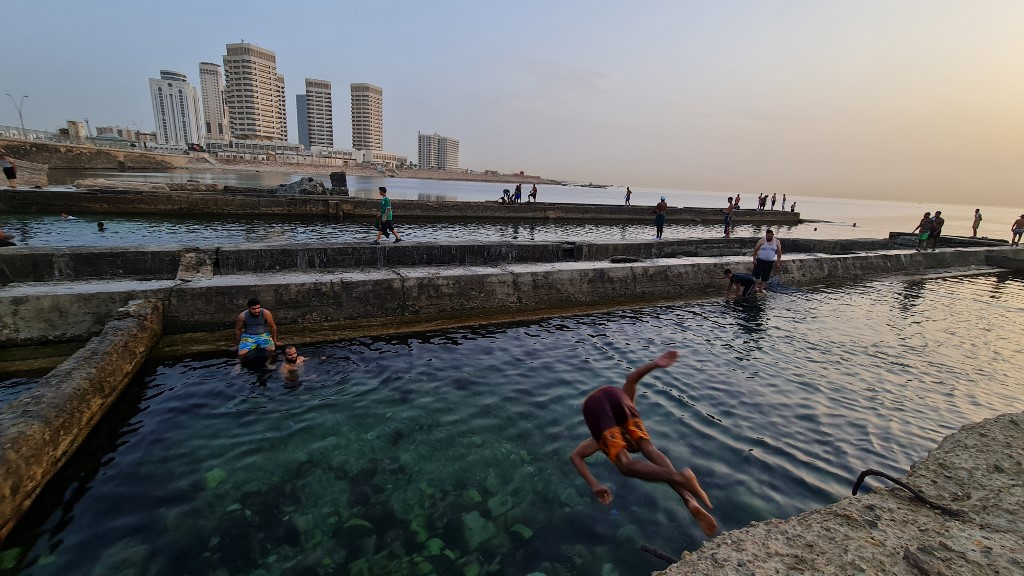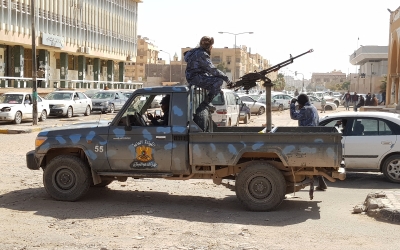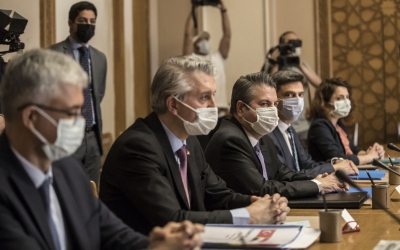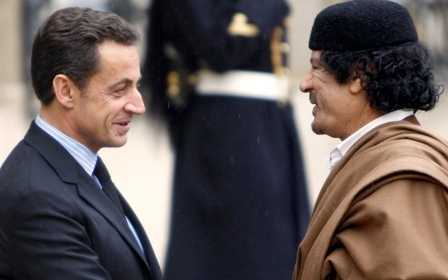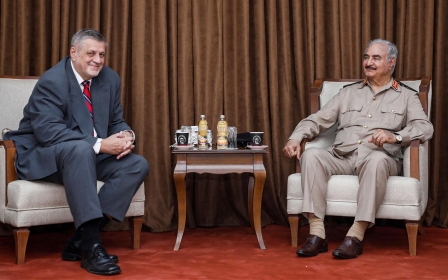Libya: Hopes for reconstruction boom clash with reality on the ground
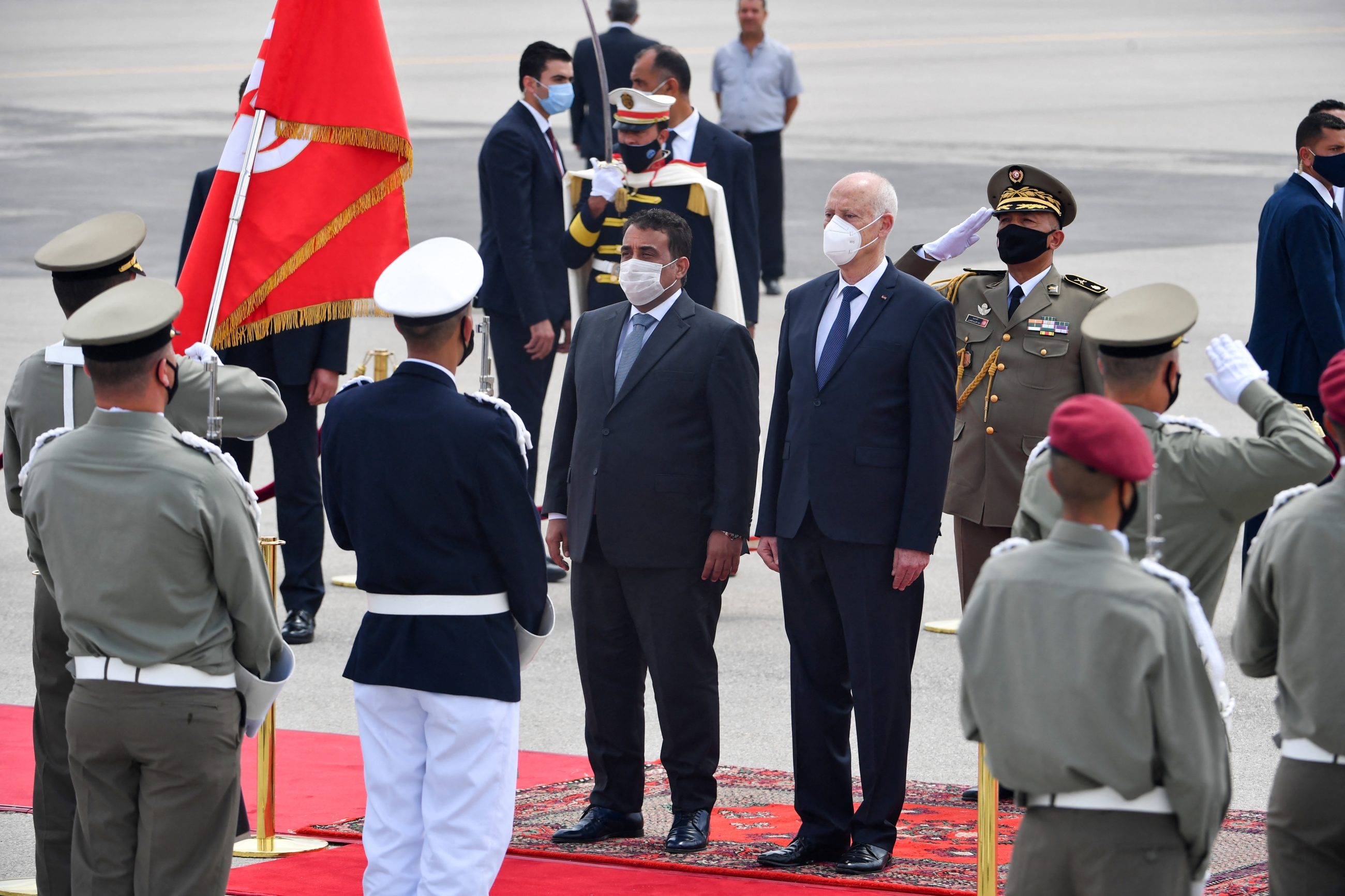
Business leaders have begun making plans to carve up responsibility for the reconstruction of Libya, a mammoth task likely to cost around half a trillion dollars.
Despite a fragile ceasefire and recent flare-ups of violence, an inaugural economic forum organised by the Italian-Libyan Business Development Association went ahead in Tunis earlier this month, with hundreds of business leaders from Italy, Tunisia and Libya gathering to discuss plans for the reconstruction of the war-torn North African nation.
A decade of protracted crisis has destroyed entire cities and has left an estimated 280,000 people living in damaged or substandard shelters, according to Libya’s humanitarian agencies.
New MEE newsletter: Jerusalem Dispatch
Sign up to get the latest insights and analysis on Israel-Palestine, alongside Turkey Unpacked and other MEE newsletters
Libya is home to the largest known oil reserves in Africa and, given its relatively small population of seven million, has one of the highest nominal per capita GDPs on the continent.
As such, foreign companies from many countries including Egypt, Turkey, Tunisia, France and Germany are lining up to win much sought-after government contracts to rebuild the country.
With elections on the horizon - promised for 24 December - delegates at the forum stressed the urgency of getting Libya’s economy up and running again, pointing to the fact that interim PM Abdul Hamid Dbeibeh’s internationally recognised Government of National Unity (GNU) currently only has a limited mandate to govern until the end of the year.
Dbeibeh has said he wants to allocate $4.9bn of the government budget for projects and development.
When Middle East Eye spoke with some representatives of the almost 90 companies at the forum, they were optimistic, full of hope for Libya’s bright future and economic potential.
'One shouldn’t see Libya as a battlefield, or a place of ruin. I see Libya as having an immense potential for development'
- Karim Berrached, CEO of Artec
“I think for the Libyan people this is really the moment, in terms of development and democracy,” said Karim Berrached, CEO of Artec, a Tunisian architecture and design agency with three decades of experience in building hospitals, hotels and institutional buildings in North Africa.
“The new government will fast track development efforts and there are lots of things to do. Not only in terms of physical reconstruction; there is also the need for many development projects for Libya’s future which are not in place right now.”
Berrached is well acquainted with the risk of investing in Libya. Artec previously operated in Libya between 2003 and 2006, but the company was forced to stop operations due to “uncertainties” associated with Muammar Ghaddafi’s administration.
“The system was a bit broken,” said Berrached. However, the architect now regrets his decision to leave Libya.
“One shouldn’t see Libya as a battlefield, or a place of ruin. I see Libya as having an immense potential for development," he explained.
'A win-win deal'
Hatem Mabrouk, founder of oil and gas consultant agency BOT Energy, was also upbeat about the potential of future Tunisian-Libyan economic partnerships.
“It’s a win-win deal,” he told MEE, “because when we work there we transfer our skills and know-how… Libyans and Tunisians: we can speak the same language, we can understand them, we have the same culture, so we will do fair business with them.”
BOT Energy has worked in Libya since 2016, despite continued upheavals and security threats.
Mabrouk says that the company took a big risk but that it ultimately paid off. “I proved myself. While Libyans were shooting bullets at each other, we continued to work successfully.”
Certainly, there is a tension between some companies’ acknowledgement of Libya’s ongoing instabiity and their eagerness to (re)start operations in the oil-rich nation.
'I proved myself. While Libyans were shooting bullets at each other, we continued to work successfully'
- Hatem Mabrouk, BOT Energy
On the night before the investment forum began, on 6 June, a car bomb exploded at a checkpoint in southern Libya, killing two members of the Libyan security forces and wounding five others.
Some days before, on 4 June, Mansour Atti, the head of a branch of the Red Crescent in Ajdabiya northern Libya, was reportedly kidnapped by armed men and hasn’t been seen since.
A close relative of Atti, who wished to be quoted anonymously for security reasons, confirmed to MEE that Atti was taken away by masked men who he said were “against elections, against reconciliation and the rebuilding of Libya”; the relative blamed the country’s total absence of security for Atti’s kidnapping.
Some Libyans, having profited from a decade of chaos and the war economy, and don’t want to see Libya stabilised. In some regions, armed militias and foreign mercenaries hold sway.
In a joint statement with three other Libyan-based NGOs ahead of last week’s peace talks in Berlin, Dax Roque, the Norwegian Refugee Council’s country director in Libya, wrote that “the stability of Libya will not come about by just holding elections or withdrawing foreign fighters…True stability can only be achieved if the lives of ordinary Libyans and the country’s many migrants and refugees are rebuilt.
“High-level discussions will fall short if they don’t also address the devastation inflicted on peoples’ lives and the very infrastructure on which they depend day to day,” Roque added.
Libya’s reconstruction however, is not just reliant on the success of the current political process and fair elections.
In an interview with MEE in Tunis, Libyan tycoon Husni Bey said that certain reforms must be implemented to incentivise the private sector before Libya has any hope of genuine economic reconstruction.
In 2018, the Libyan private sector was estimated to have generated $8.3 billion, corresponding to just 17.3 percent of Libya’s GDP.
Under Muammar Ghaddafi, Libya witnessed sweeping economic and social reforms in line with his "Green Book" manifesto.
In 1978, many companies (including oil companies) were nationalised, subsidies on certain goods and low-cost “people’s supermarkets” were introduced, and a stringent law forbidding ownership of more than one private property was passed.
Until the mid-2000s, dominance of the state and lack of competition meant that the growth of the private sector was considerably stunted and foreign investment was discouraged.
Unlocking real estate
Little has changed since Libya’s pre-conflict era. Bey said that though Gaddafi is now gone, many figures from his administration with the same mentality and economic attitudes remain in positions of influence.
Of the main obstacles preventing the development of the Libyan private sector, Bey said that the housing registry must be unlocked, allowing billions of dollars worth of real estate to become bankable.
'I would love to see an election because that will avoid us having another war. But if we have proper governance, whether they are elected or not elected doesn’t matter so much'
- Husni Bey, Libyan businessman
Bey also says that the Libyan stock market once again needed to become operational and for Libya’s central bank to become a regulated, government body.
"I know that the potential for Libya is great. The fundamentals are there but there’s a mismatch: the management of these possibilities has always been a problem and the government needs to implement reforms” says Bey.
“As a businessman, I don't care whether the next president is elected or unelected. I want to be honest. I would love to see an election because that will avoid us having another war. But if we have proper governance, whether they are elected or not elected doesn’t matter so much.”
Premature?
Libyan financial journalist Ahmed Sanussi sees such economic forums and discussions around Libya’s reconstruction as premature.
“Every country wants different benefits from Libya but we cannot do anything in Libya until we inside Libya have decided if we want to continue our war or not,” said Sanussi in an interview with MEE in his Tunis-based TV studio.
“Once we have decided, only after that can we negotiate deals with Italy or Tunisia because then we will know what we want from each country.”
With Libya still facing a steep hill to climb in terms of ongoing political and social uncertainties, Sanussi is not optimistic that the peace process will be a success.
“I think there will be a new war, 100 percent, because the reasons for the war of the past are still there today.
"I’m not scared that the Libyan people will make war before the election, but I am scared they will make it after the election.”
This article is available in French on Middle East Eye French edition.
Middle East Eye delivers independent and unrivalled coverage and analysis of the Middle East, North Africa and beyond. To learn more about republishing this content and the associated fees, please fill out this form. More about MEE can be found here.


